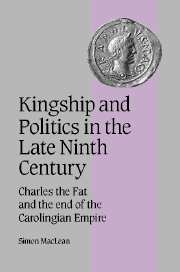 Kingship and Politics in the Late Ninth Century
Kingship and Politics in the Late Ninth Century Book contents
- Frontmatter
- Contents
- List of maps and figures
- Acknowledgements
- List of abbreviations
- Note on names, terminology and citations
- Outline chronology
- Figure 1 The Carolingian family
- Map 1 The late Carolingian empire
- 1 INTRODUCTION
- 2 UN-FRANKISH ACTIVITIES: CHARLES THE FAT IN THE EYES OF CONTEMPORARY ANNALISTS
- 3 THE MEN WHO WOULD BE KINGS: THE ‘SUPERMAGNATES’ AND THE ‘RISE OF THE ARISTOCRACY’
- 4 ROYAL POLITICS AND REGIONAL POWER IN THE LATE CAROLINGIAN EMPIRE
- 5 THE END OF THE EMPIRE I: POLITICS AND IDEOLOGY AT THE EAST FRANKISH COURT
- 6 THE END OF THE EMPIRE II: RESPONSE AND FAILURE
- 7 HISTORY, POLITICS AND THE END OF THE EMPIRE IN NOTKER'S DEEDS OF CHARLEMAGNE
- 8 CONCLUSION
- Bibliography
- Index
- Cambridge Studies in Medieval Life and Thought Fourth Series
2 - UN-FRANKISH ACTIVITIES: CHARLES THE FAT IN THE EYES OF CONTEMPORARY ANNALISTS
Published online by Cambridge University Press: 15 July 2009
- Frontmatter
- Contents
- List of maps and figures
- Acknowledgements
- List of abbreviations
- Note on names, terminology and citations
- Outline chronology
- Figure 1 The Carolingian family
- Map 1 The late Carolingian empire
- 1 INTRODUCTION
- 2 UN-FRANKISH ACTIVITIES: CHARLES THE FAT IN THE EYES OF CONTEMPORARY ANNALISTS
- 3 THE MEN WHO WOULD BE KINGS: THE ‘SUPERMAGNATES’ AND THE ‘RISE OF THE ARISTOCRACY’
- 4 ROYAL POLITICS AND REGIONAL POWER IN THE LATE CAROLINGIAN EMPIRE
- 5 THE END OF THE EMPIRE I: POLITICS AND IDEOLOGY AT THE EAST FRANKISH COURT
- 6 THE END OF THE EMPIRE II: RESPONSE AND FAILURE
- 7 HISTORY, POLITICS AND THE END OF THE EMPIRE IN NOTKER'S DEEDS OF CHARLEMAGNE
- 8 CONCLUSION
- Bibliography
- Index
- Cambridge Studies in Medieval Life and Thought Fourth Series
Summary
From the reams of pages which have been devoted by historians to the practice of Carolingian kingship, perhaps only Charles the Fat has emerged with the reputation of a ‘failed king’. This judgement is all the more striking in the similarity of the terms in which it has been postulated. The uniformity of opinion has proved remarkably impervious to changes in time, fashion and historiographical genre. Thus while the tone of William Stubbs's rather extreme judgement, that Charles was ‘dangerous and unmanageable; a diseased, idiotic raving madman … who was probably put out of the way for his own good’ could easily be put down to Victorian sensibilities and ideas about the asylum, it is significant that judgements of Charles even in vastly more subtle and sophisticated recent studies have been expressed using a similar idiom. Likewise, specialised articles on the reign are no less likely to comment negatively on Charles's personality and abilities than textbook summaries of the period.
This generally held belief in the personal inadequacy of Charles to fulfil the office of king is expressed in terms of three quite specific major criticisms which are met again and again in the modern historiography. These are: firstly, that he was dominated by his advisers, especially his archchancellor Liutward of Vercelli; secondly, that he was incapable in his dealings with the Vikings; and thirdly, that he was sickly, inactive and immobile, a do-nothing king.
- Type
- Chapter
- Information
- Kingship and Politics in the Late Ninth CenturyCharles the Fat and the End of the Carolingian Empire, pp. 23 - 47Publisher: Cambridge University PressPrint publication year: 2003
- 1
- Cited by


